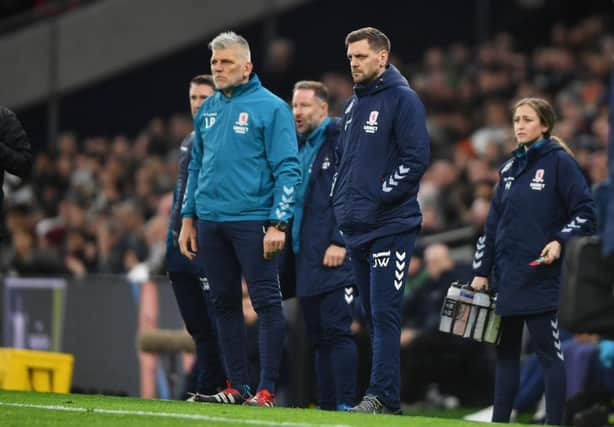Long read: We all want football to return this season but Boro will have to tread carefully if it does


Second tier clubs are poised to return to training in the next few days, with the first stage allowing players to work in small groups with social distancing measures in place.
There will inevitably be bigger hurdles to overcome, not least reintroducing the contact element and convincing players from 24 separate clubs that it’s safe to resume.
Advertisement
Hide AdAdvertisement
Hide AdThen what happens if someone at a club tests positive for Covid-19? Will several members of the squad have to go into quarantine? Would they continue playing without a key player? Or even forfeit crucial games?
Still, returning to the training ground is a start, at least showing the league is serious about getting things up and running again.
The prospect of curtailment remains more than a possibility, though, with Championship clubs set to vote on an outcome in the coming days.
If 51 per cent opt it’s not safe to complete the season, the remaining games will be decided on an average points-per-game system, with promotion and relegation included.
Advertisement
Hide AdAdvertisement
Hide AdOn the face of it, that would be the best outcome for Boro - afterall let’s not forget the precarious position they are in.
If the season can’t be completed, Jonathan Woodgate’s side would finish 19th in the table and avoid relegation in what has been a challenging campaign.
So in the case of personal interest, which has become something of a theme in the last few months, and based on league standings alone, it appears the likes of Boro, Stoke, Huddersfield, Wigan and Hull would benefit from the season ending.
In contrast, Charlton (who dropped below Boro after losing to the Teessiders last time out), Barnsley and Luton would be sent down.
Advertisement
Hide AdAdvertisement
Hide AdBased on that, you may expect Boro to vote against restarting the season. It’s already been reported that Hull want the season to be voided, while Charlton boss Lee Bowyer has said ‘it would be wrong’ to use the points-per-game formula.
Obviously there are serious health concerns too - take Watford captain Troy Deeney for example. The 31-year-old understandably decided not to return to training with the Premier League club, due to fears he could pass the virus onto his five-month old son who’s had breathing difficulties.
Like Deeney, Chelsea striker Tammy Abraham is part of the BAME (black, Asian and minority ethnic) community, who are reportedly more likely to contract the virus.
Abraham, too, has voiced concerns he could pass the virus onto members of his family who live in the same household, particularly his father who suffers from asthma.
Advertisement
Hide AdAdvertisement
Hide AdYet, with the cost of promotion and relegation so high, clubs are still likely to vote in their own interests, based on their financial and league positions.
Interestingly, the noises from Boro suggest they want the season to be restarted if safe to do so - despite the threat of relegation.
Still, whichever way the Teessiders vote, that’s the right mindset to be in. It would be a dangerous tactic to call for, and expect, the season to be cut short - only to be caught cold when fixtures commence.
There will be no time for a slow start either. Boro are still just two points above the bottom three with nine games to go. A couple of defeats upon resumption would place them in real danger.
Advertisement
Hide AdAdvertisement
Hide AdFor a club which began the season with hopes of promotion, the thought of dropping into League One was alarming before the coronavirus pandemic. With the added uncertainty and financial restraints, relegation would simply be disastrous.
On paper, you may think Boro should have enough to stay up. Following that 1-0 win at Charlton in March, it certainly looked like they were turning a corner.
Woodgate’s side should have beaten promotion-chasers Nottingham Forest just five days earlier, and had favourable-looking home fixtures to play.
Yet returning to action in around a month’s time would completely skew the landscape.
Advertisement
Hide AdAdvertisement
Hide AdForm would go out of the window and there would be less of an advantage playing at the Riverside, where six of Boro’s nine wins have come this season. Players won’t be as sharp and may have lost confidence following a prolonged break.
After 37 league games we’ve seen what Woodgate’s side are capable of - the good and the bad.
When they had belief, Boro recorded an excellent 2-0 win against league leaders West Brom away from home. When they didn’t, back-to-back defeats to Luton and Barnsley proved costly.
Before that win at Charlton, the Teessiders went 10 league games without a win. A repeat of that would see them relegated.
Advertisement
Hide AdAdvertisement
Hide AdOf course it’s the same for every club, yet the three-month delay will significantly change the circumstances.
Will every player be able to perform at their best, or even agree to play, with the ongoing health concerns?
Is it fair that Boro, for example, played Leeds at a packed-out Elland Road while some of their relegation rivals won’t have that disadvantage?
Could some clubs suffer with an influx of injuries during the condensed fixture schedule?
Advertisement
Hide AdAdvertisement
Hide AdRealistically, due to a factor that no one in football could control, an element of sporting integrity went out of the window when the season was suspended in March.
Obviously the fairest way to conclude the season, deciding which clubs are promoted and relegated, would be to play the remaining games - whenever safe to do so.
Yet there’s no question the dynamics of the season will have altered, meaning clubs like Boro will have to tread even more carefully.
